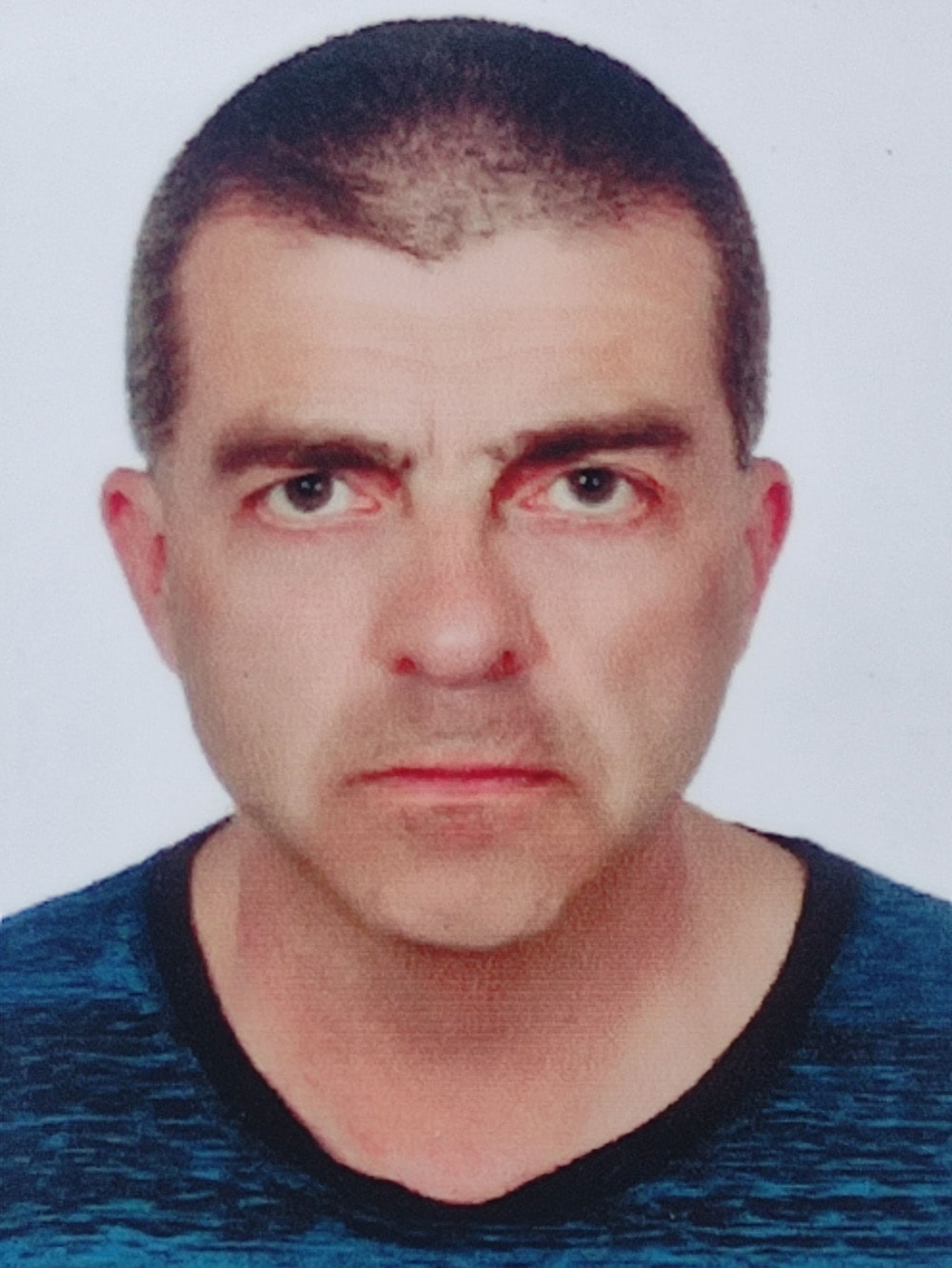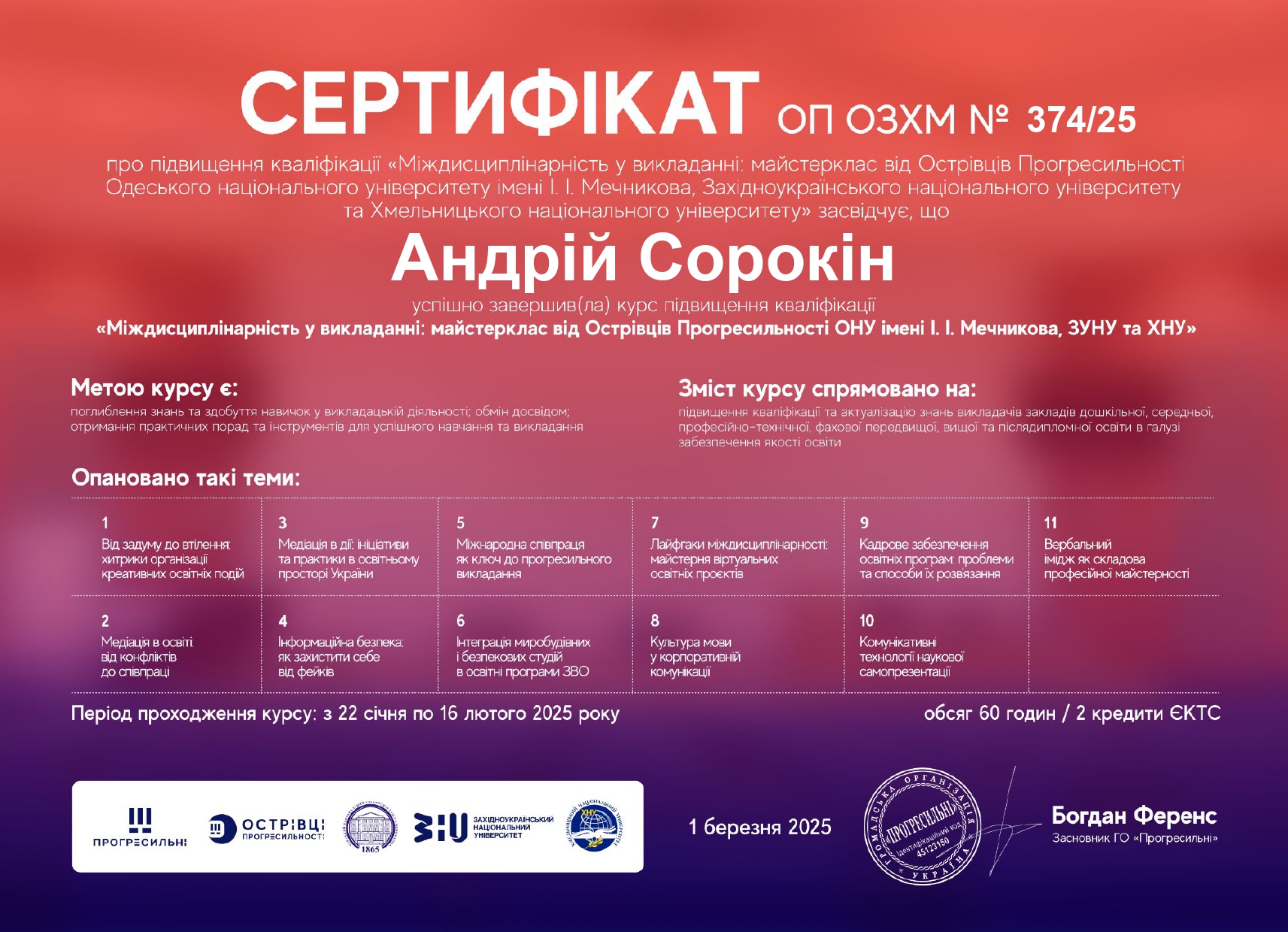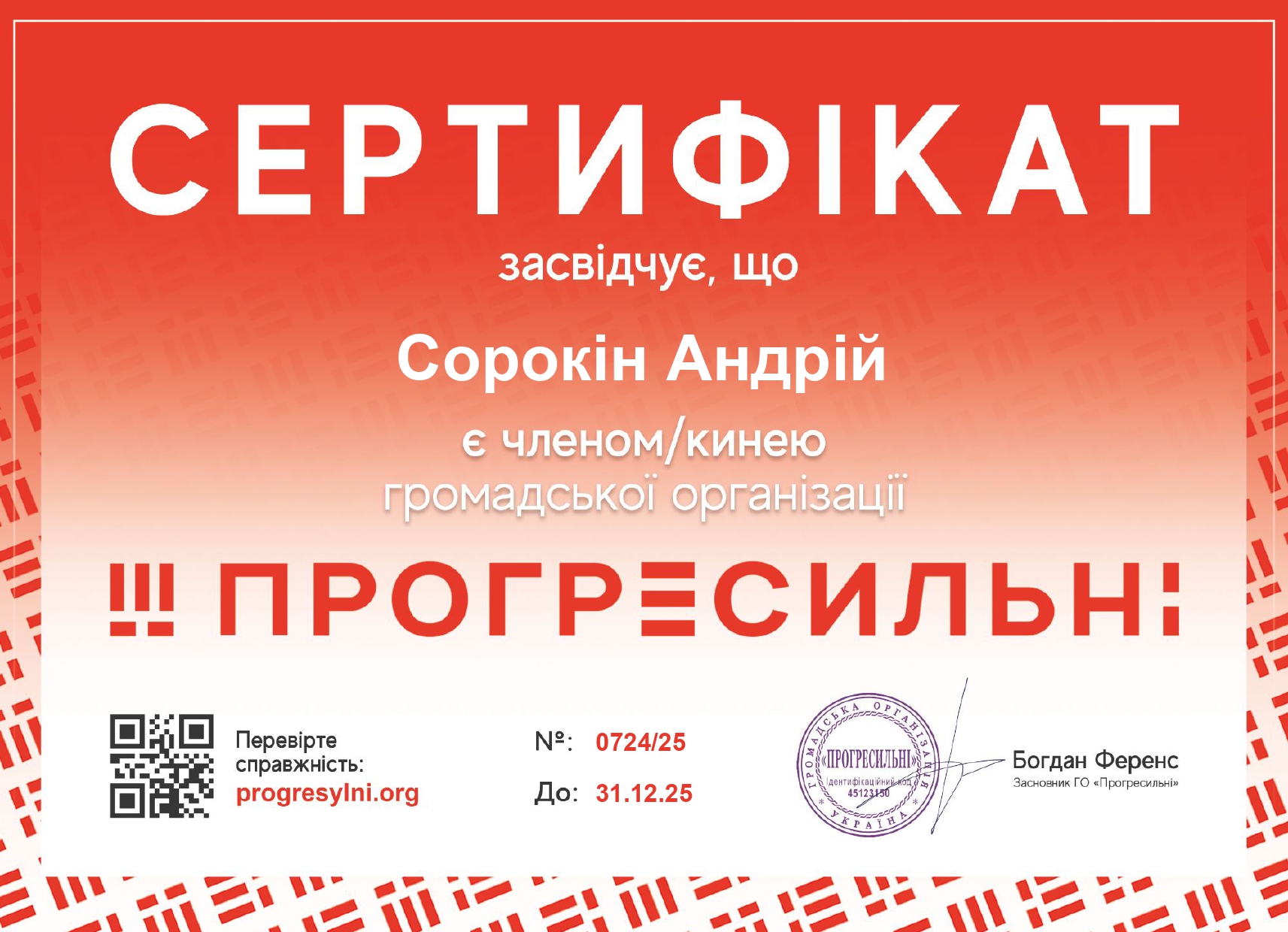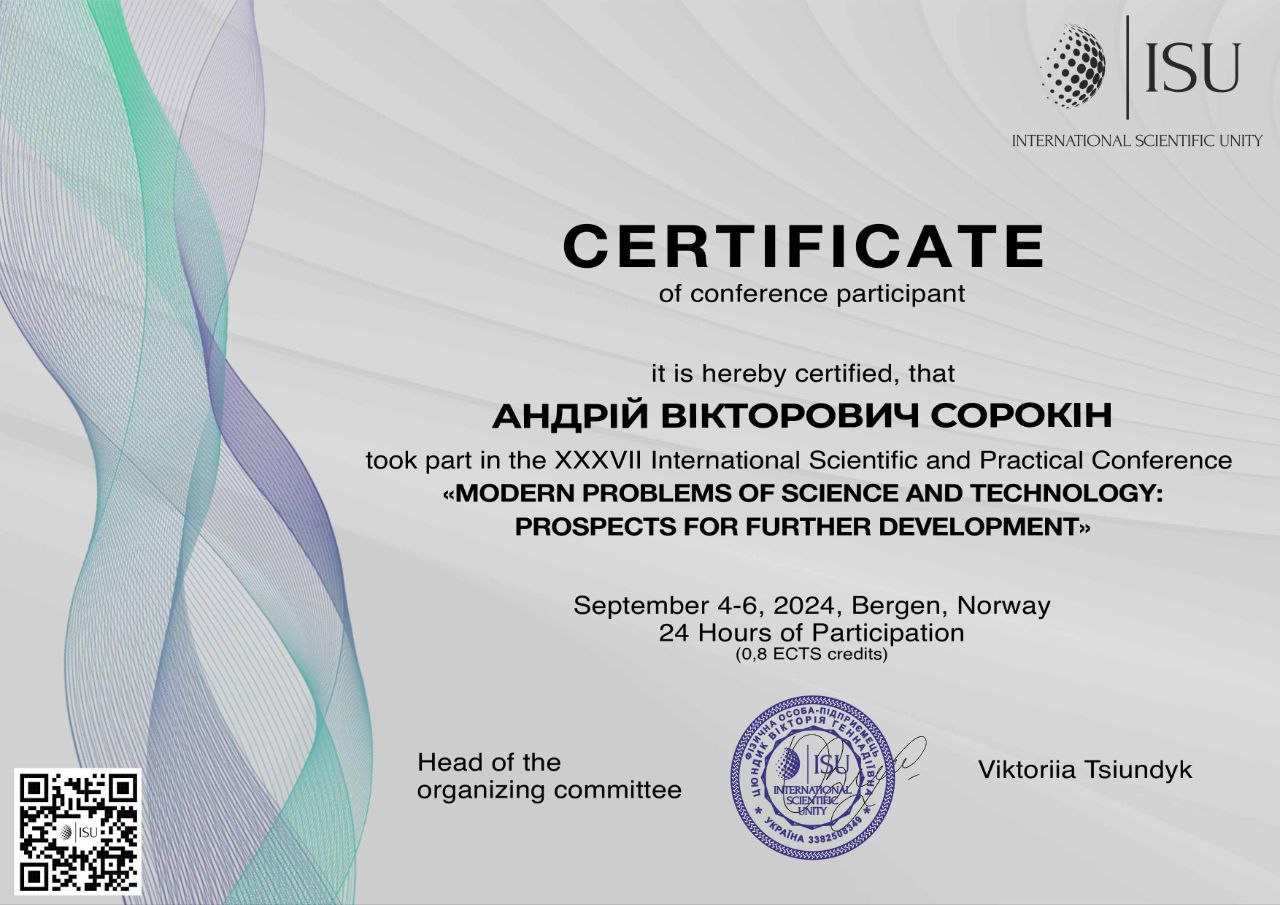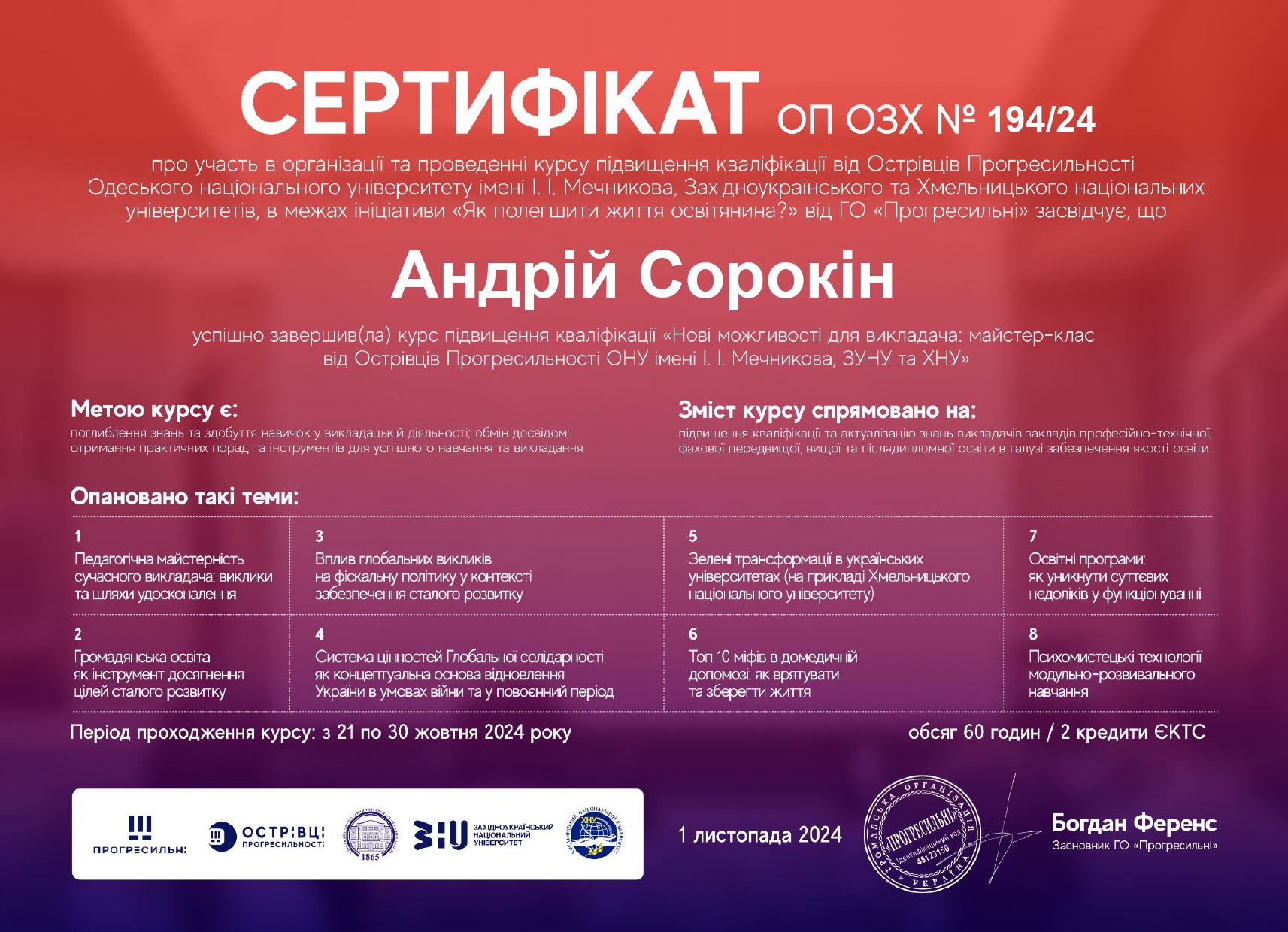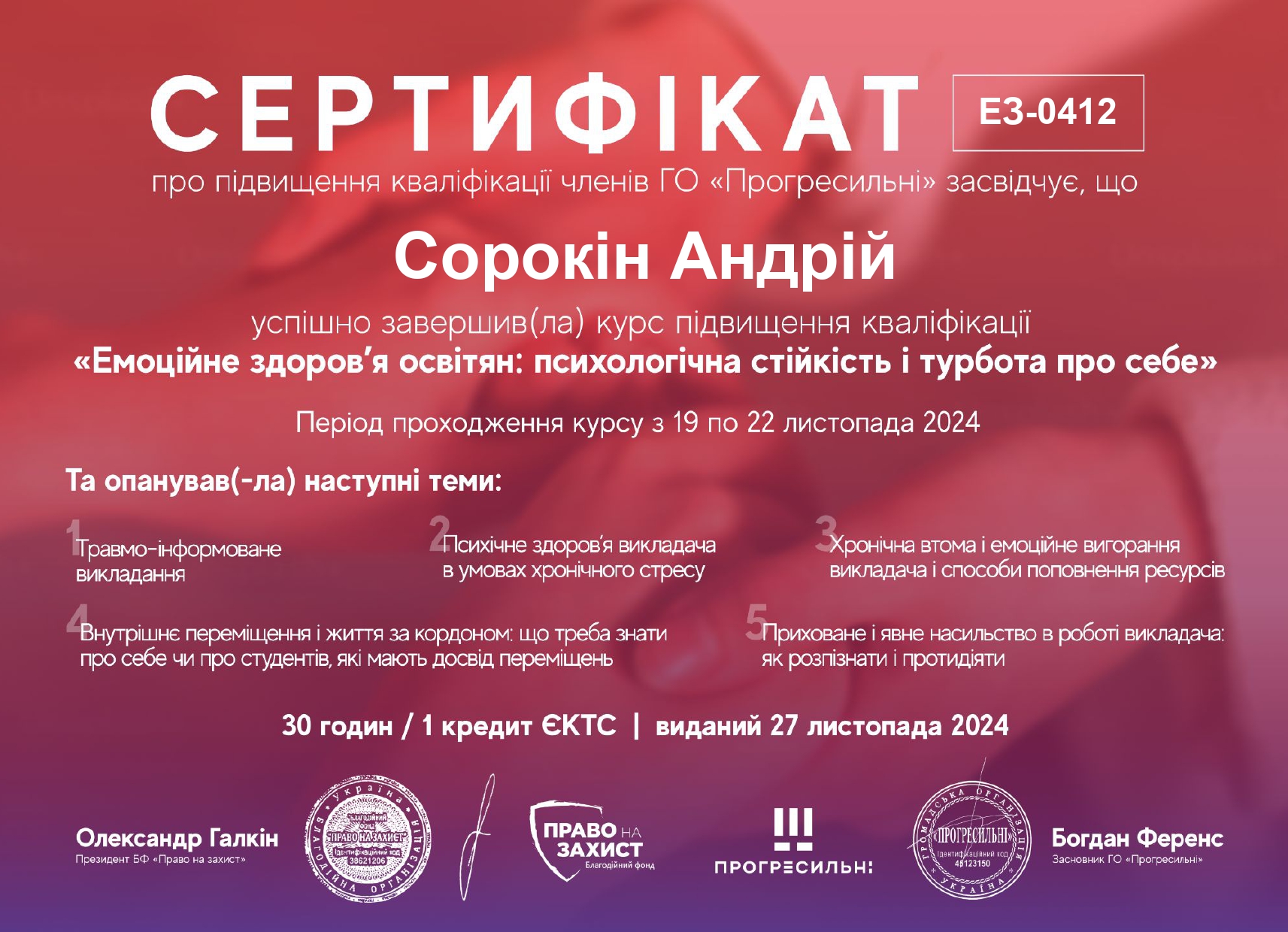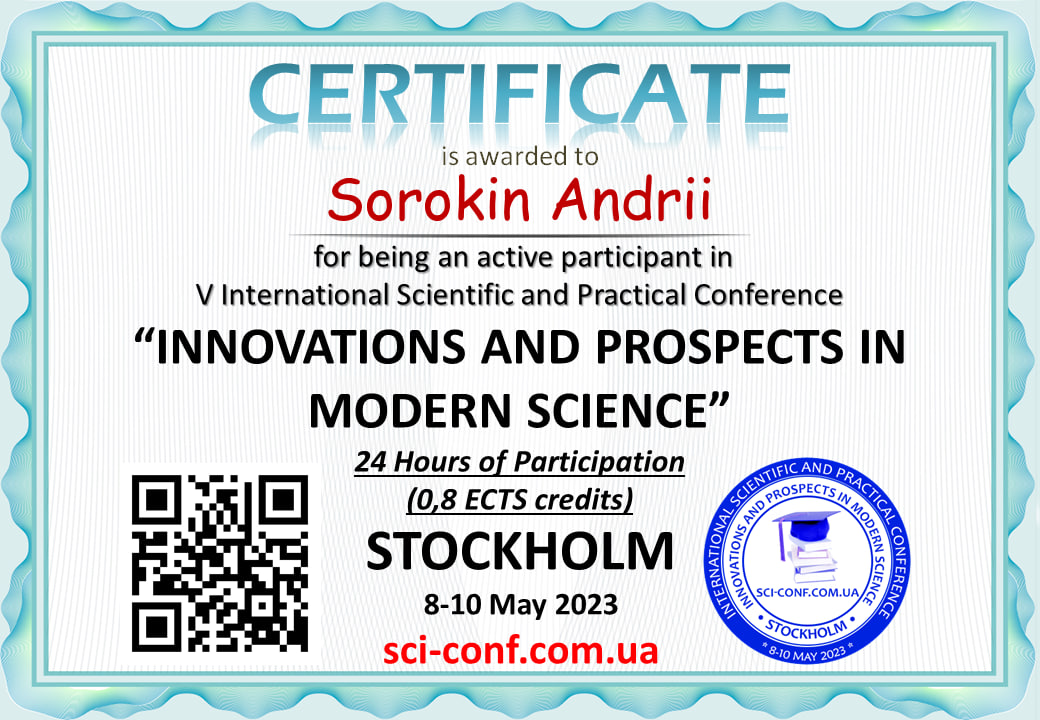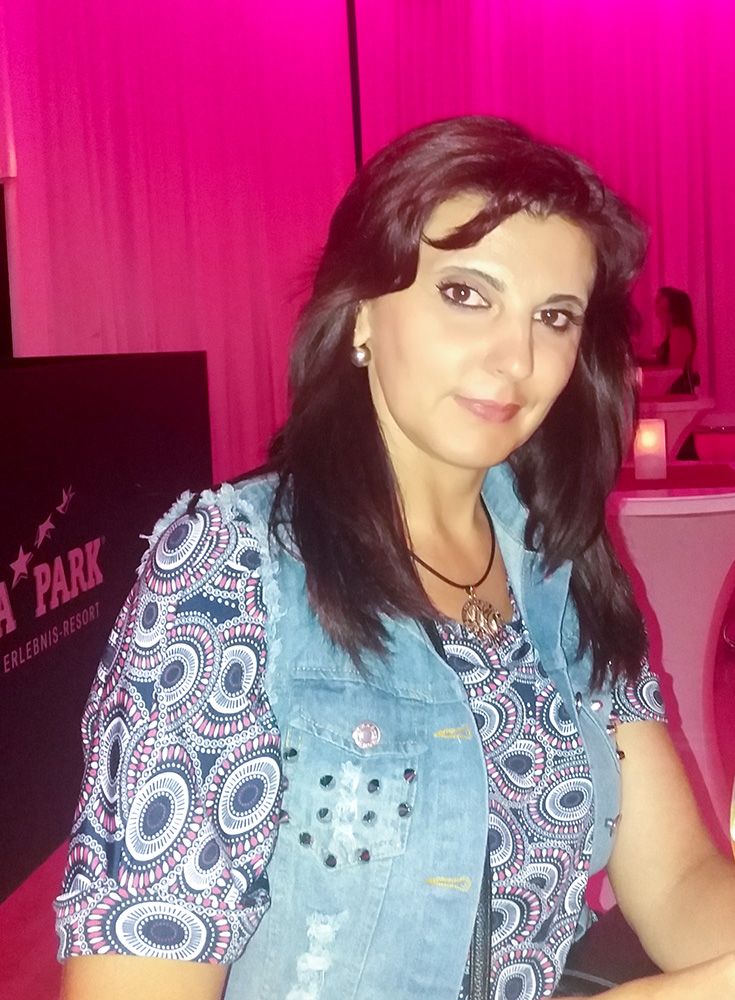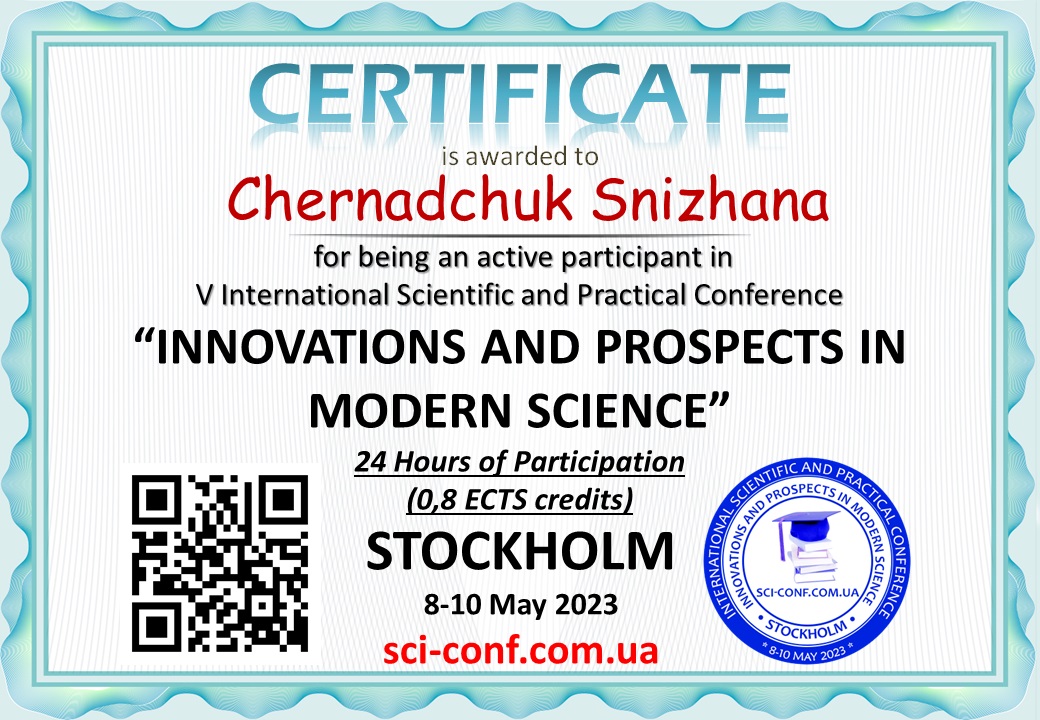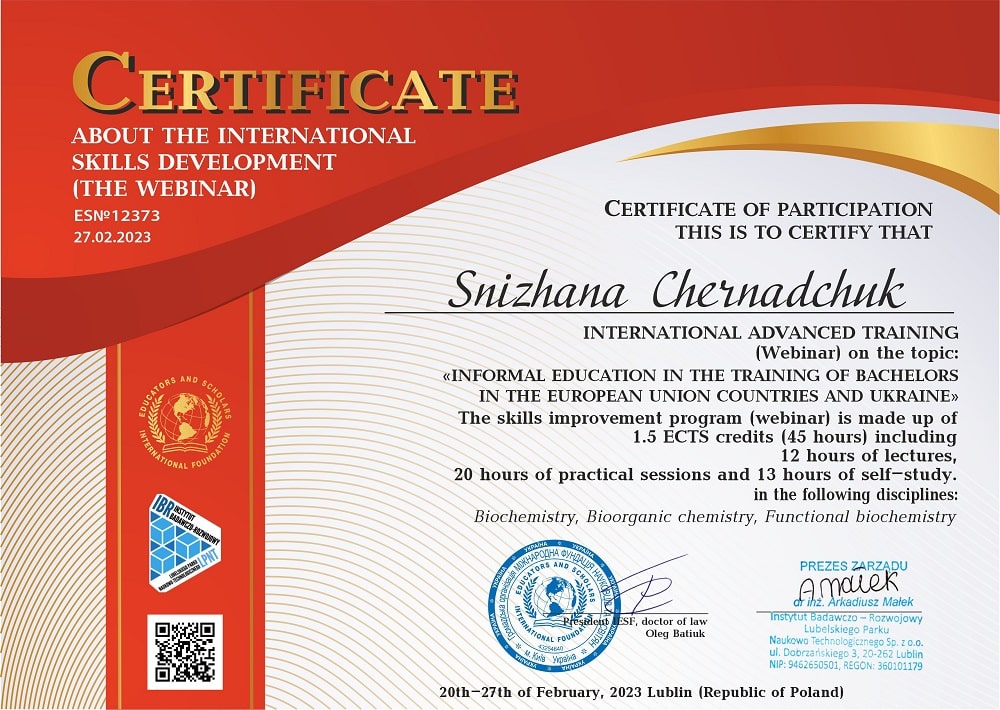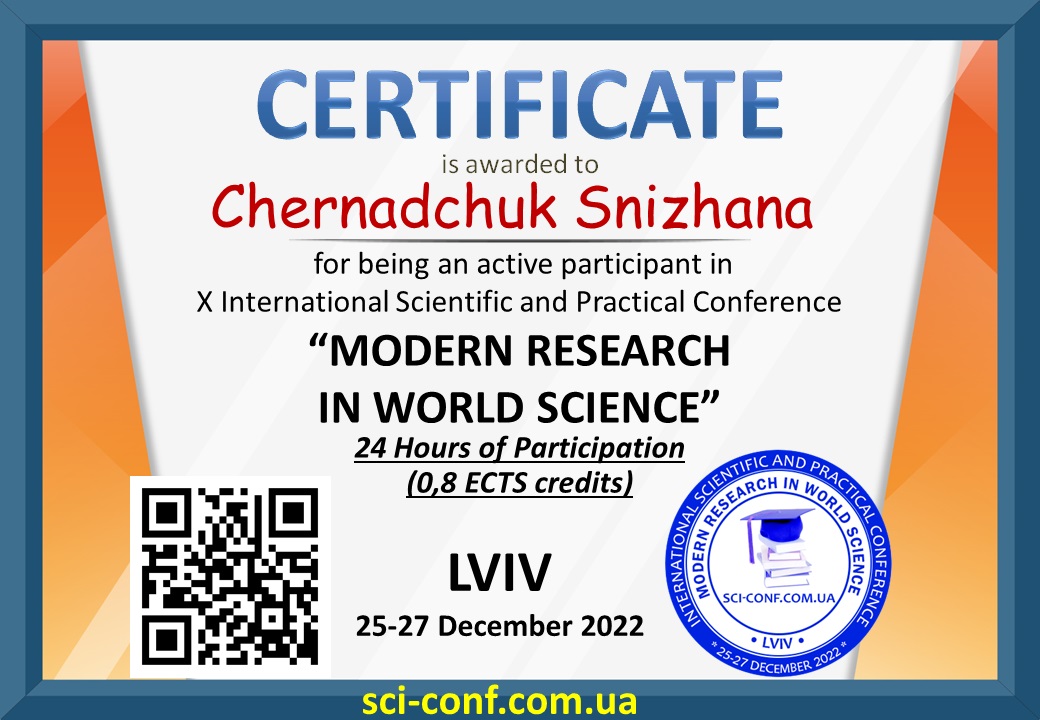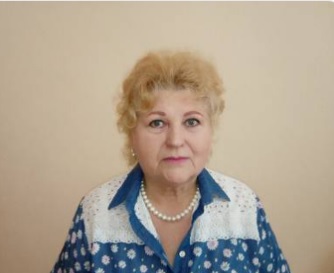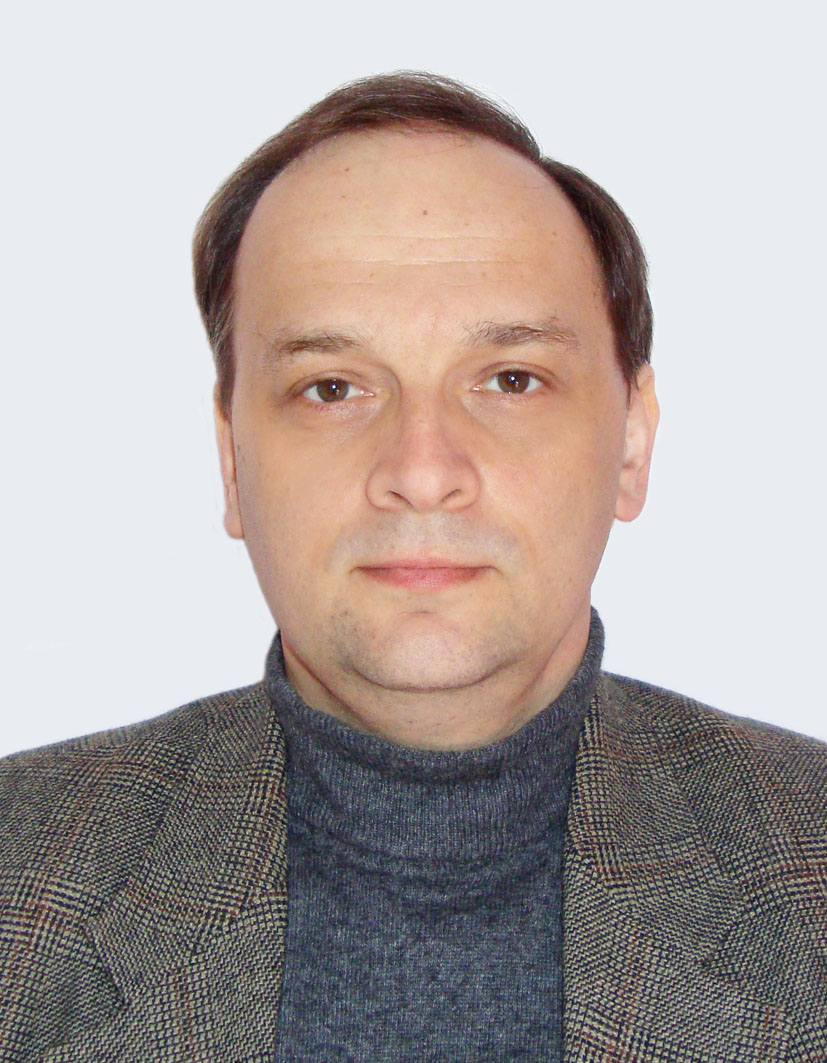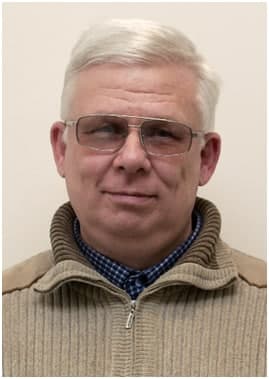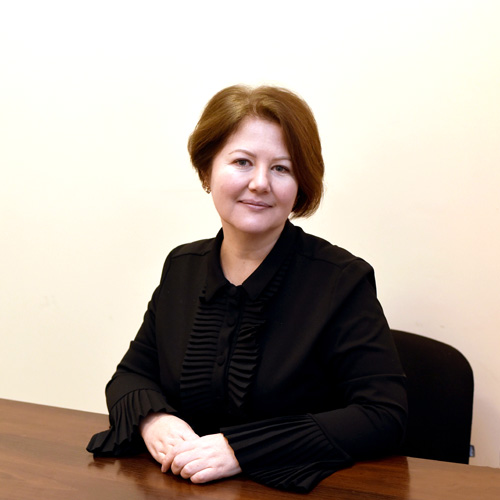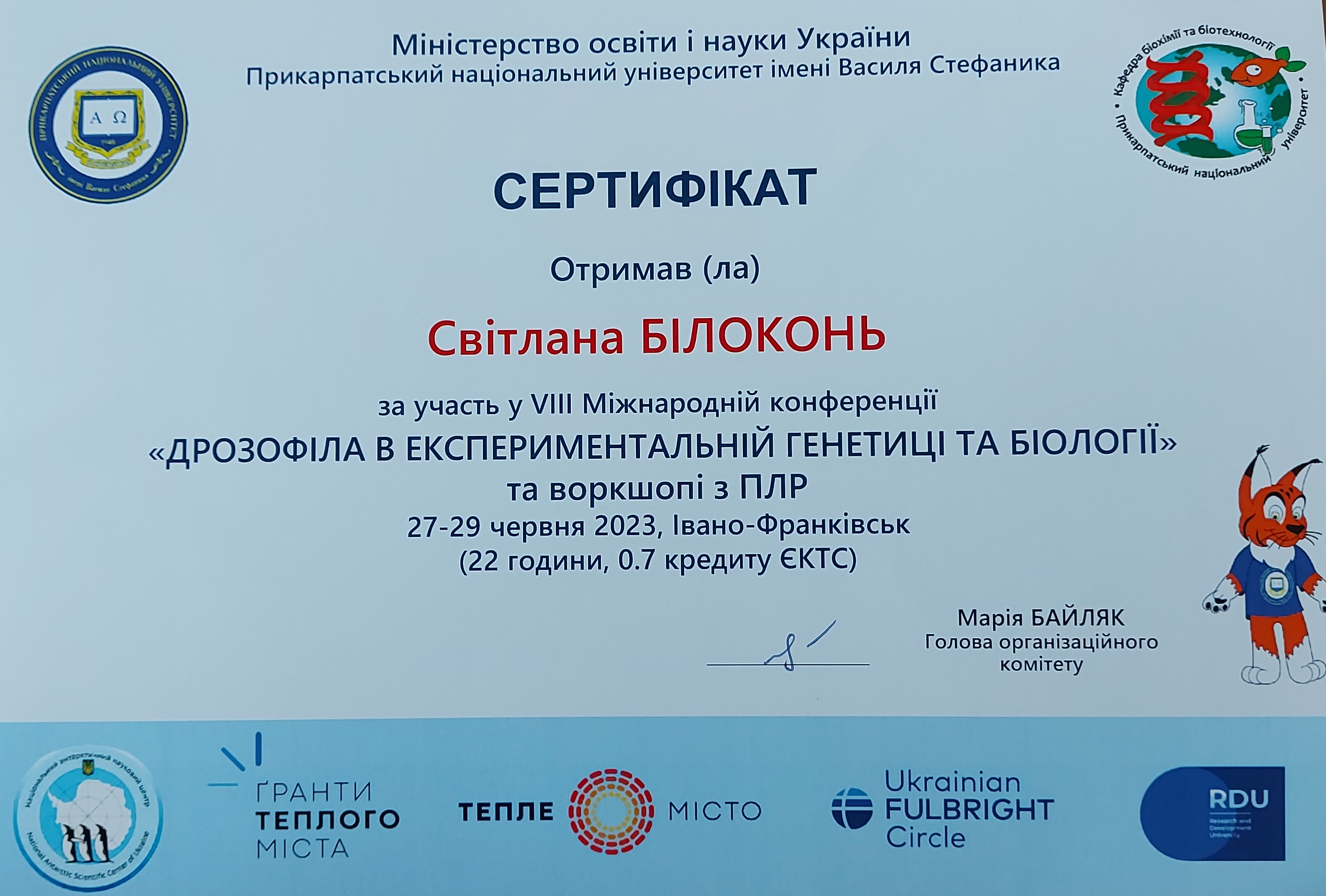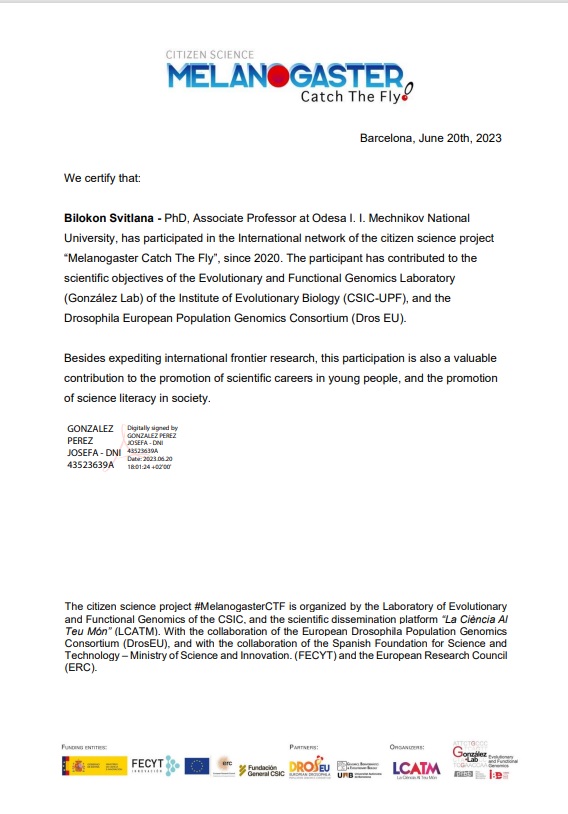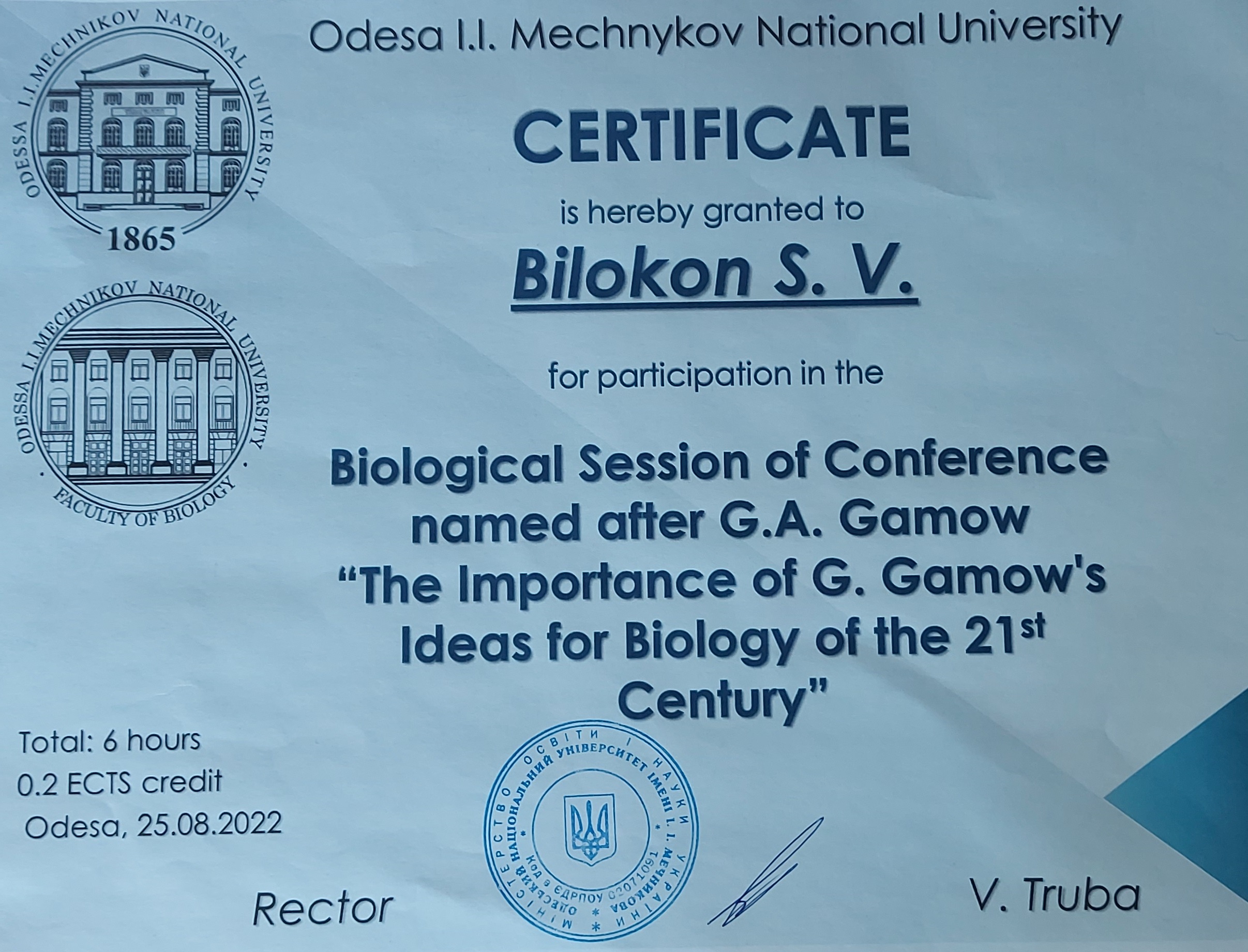The course of lectures "The laws of heredity and method of selection of crops" in Odessa (then Novorossiysk) University at the Natural Department of Physics and Mathematics faculty was first started reading by assistant professor Andrew Opanasovych Sapyehin in 1912. It happened when Andrew Afanasievich had returned from annual abroad trip to Europe laboratories. He was strongly influenced by Berlin geneticist Professor E. Baur and Prague cytologist and geneticist B. Němec, author of numerous works on heredity in plants. "Laws heredity, as selective breeding base of agricultural plants" were published in 1912. This course of lectures was issued by Andrew Opanasovych presented the book E. Baur «Einführung in die experimentelle Vererbungslehre». A year later lectures that read A.O. Sapyehin at the university, was called "Genetics and breeding", and his textbook "Fundamentals of the theory and methods of selective breeding agricultural plants", had been published in 1913, was one of the first native guidelines for selection, which was based on genetic laws.
In the same period Sapyehin A.O. became the head of the department of Odessa breeding research field in South Russian Society of Agriculture. Since 1917 Andrew Opanasovych had been extraordinary, and then full professor in the Department of Agronomy of the University of Novorossiysk. The information about this department and lecturers at that time was not found. However, it is known that agronomic laboratory, which Sapyehin A.O. was involved, worked in the Novorossiysk University in 1916-1918. A. O. Sapyehin continued teaching genetics in Novorossiysk University until 1922 and also conducted classes at the Odessa Agricultural Institute from 1918 to 1928. In May 1920 Novorossiysk University was reorganized into the Odessa Institute of Public Education, which brought together several universities and lasted a whole decade. According to historical essays, the Faculty of Social Education and Professional Education were functioned in the Odessa Institute of Public Education in the 1922/1923 years. The Departments of Mathematics, Agrobiological, History, Literature and Language were consisted in the Faculty of Professional Education. Probably A.O. Sapegin taught in the Agrobiological Faculty at that time. In 1923 the People's Commissariat of Ukraine charged to Professor of Odessa Agricultural Institute A.O. Sapyehin to direct of newly formed research Plant department in this Institute. During these years A.O. Sapyehin had published a number of methodological papers and textbooks on genetics and breeding. There were " Mean error and its significance for the evaluation of arithmetic during comparative tests" (1914), " Determination of the accuracy of field experience with the help of elements of variation statistics "(1921)," Variation statistics " (1922, reprinted six times until 1937), "General method of breeding crops" (1925). The collections of “Mendelism Steps "(1923) and " Milestones of selection” were edited as well.
In 1918 the Department of breeding of Odessa research field headed by A. O. Sapyehin was converted into Odessa agriculture breeding station, where under his leadership the new methods and apparatus, including ˗ cytological methods, X-ray and refrigerators, flour baking laboratory, greenhouses and others has been implemented in the scientific process. 10 years later the Ukrainian genetic-breeding institute directed by A. Sapyehin until 1931was organized at the station. I n severe winters 1927-1928 and 1928-1929 the created by Sapyehin wheat varieties Kooperatorka and Zemke severely damaged or even completely lost, this fact contributed to A. O.Sapyehin . The scientist was accused of sabotage and arrested on the orders of the USSR People's Commissar of Agriculture Y.A. Yakovlev. After his arrest in the years 1931-1933 A.O. Sapyehin was a deputy director of research of UGBI.
M.I. Vavilov knew and highly valued as a specialist Andrew Opanasievich and persistently invited him to the post of Deputy Director of the Institute of Genetics of the USSR. In 1933 A. O. Sapyehin accepted the invitation and left Odessa. From 1933 to 1946 he worked as deputy director of the Institute of Genetics of the USSR and at the same time in 1936 headed the Department of Genetics and Plant Breeding Institute of Botany of the USSR.
For over 20 years Sapyehin A. O. remained the main organizer and performing various activities that have the goal of creating scientific institutions in Odessa genetic and breeding direction and training qualified personnel for them.
In 1933 Odessa State University (OSU) was restored and biological faculty was created within it. After A.O. Sapyehin departure to the Academy of Sciences the employee of Genetic Breeding Institute M.O. Olshansky taught genetics at the University ding from 1931 to 1937, and then V.F. Hytrynskyy lectured this subject. He was an employee of the same institute, and later defended his doctoral thesis " Directional changes in plant heredity through education as a selection method " (1959). Both scientists were supporters of "Michurin genetics" and encouraged supporters T. D. Lysenko.
After the University had returned from evacuation Professor G.A. Mashtaler (Chief of department of Darvinism) became the dean of biological faculty as a scientist he was highly critical of genetics-morhanistics. At that time Associate Professor of Agricultural Institute J.P. Miryuta gave lectures on genetics. He was strongly influenced by G.A. Levitskaya and G.D. Karpechenko whom he considered to be his scientific teachers. Yuri Petrovich Miryuta was a prominent geneticist, scientist-breeder, the teacher, one of the brightest representatives of Vavilov period plant genetics, he had done much to revive genetics in the country and overcome Lisenko monopoly in Soviet biology, these words would be written later, in biographical article. Meanwhile in 1944 J.P. Miryuta moved to Odessa from Gorky State University, where he led a specialization of genetics and plant breeding at the Department of Genetics, which was headed by S.S. Chetverikov at that time. Until 1948 J.P. Miryuta headed of Department of selection and seeding of Odessa Agricultural Institute and associate professor of OSU. In those years, Yuri Petrovich prepared his doctoral thesis " The genetic nature of heterosis" (1947), which has been offered a new theory of heterosis. However, due to infamous for biological science in the USSR in 1948 session Agricultural Sciences thesis failed.
Independent department of genetics at OSU was opened in September 1949 by dean of biological faculty candidate of agricultural sciences Andrei Ivanovich Vorobyov, which was transferred to OSU for the year before from Union Selection and Genetics Institute (VSHI) for University "strengthen by michuryntsy". In 1955, this department was renamed the Department of Genetics and Darwinism, and in May 1978 was reorganized into the Department of Genetics and Molecular Biology by initiated a new dean and head of Department Vladlen Nikolayevich Totsky.
In 1923 A.I. Vorobiev (1902-1991) graduated the Odessa Agricultural Institute as agronomist-growers. His graduate training took place at the department of genetics and breeding of the same institute under the supervision of Professor A. Sapyehin in 1925-1929. By the initiative of A. Sapyehin A.I. Vorobyov was sent to Leningrad and Moscow to review the new scientific method and study literature in the best genetic labs. The trip proved fruitful: literature was collected for fundamental work "Multiple chromosome numbers in closely related forms". Successful work contributed to the knowledge of foreign languages and possession cytogenetic methods made it possible to save their own experimental data, on the recommendation of M. I. Vavilov and G.A. Levitsky manuscript was accepted for publication.
After graduation A.I. Vorobyov worked for some time in the lab of G.A. Levitsky (Leningrad, VIR). After returning to Odessa, he worked at the Ukrainian Institute of genetic and breeding (UHSI) as a specialist at the department of plant physiology, then as a senior researcher. It should be noted that in October 1929 Lysenko held position as senior specialist of lab plant morphology in the same institute.
In 1938 A.I. Vorobiev awarded candidate of sciences in biology in agricultural sciences without defending a thesis. Doctoral thesis was defended in the Mechnikov ONU in 1951.
A.I. Vorobyov was appointed the head of the OSU Department of Genetics in a year after the August Agricultural Sciences session in 1948, he was held positions defeat Mendelism-morhanizm. A.I. Vorobyov headed the department from 1949 to 1977. He had the attention of the educational process and research work of teachers and students, but in the direction of "Michurin studies" Perhaps to promote "advanced Michurin studies", written by A.I. Vorobyov textbook "Fundamentals of Michurin Genetics" (1950) was translated into Polish, Czech, Romanian, Japanese and Chinese. A.I. Vorobyov created at their own expense agrobiological area (near the biological faculty) with a garden, flower garden, herbs to improve the teaching and educational work. Thus, the stage was set for students to get the skills forming the crown of fruit trees, care for plants, creating test sites in order to meet student projects and dissertations under the supervision. This increased level of practical training of students as future professionals, biologists, teachers and schools.
A.I. Vorobyov read his general course "Genetics of breeding basics" by the program of the ministry because the Department of Genetics was formed and developed under the Lysenko dictatorship. According to data compiled by D. Ursu, in autumn 1947 A.I. Vorobiev put his signature under collective letter to senior officials VSHI Minister of Higher Education, which was a requirement to remove from teaching "bourgeois pseudoscience" - genetics in agricultural universities.
Under the leadership of A.I. Vorobyov the Department provided general training course "Introduction to Biology" (Associate Professor O. Radchenko), "Genetics of breeding basics" (Professor A. Vorobyov), "Darwinism and the History of Biology" (Associate Professor P. Dmytrashko), "Plant growing" (Associate Professor I. Sahaydak), "Cytology with the basics of embryology" (Senior Teacher Z. Kotz) and special courses "Biology of plant development", "General selection", "Some chapters of genetics "(Professor A. Vorobyov).
The cytogenetic methods took an important place at special courses, genetics and cytology laboratory studies, specialized practicum. The cytoembriologycal investigations of cross-pollinated plants (corn, rye, sunflower) for their self-pollinated stigmas after pretreatment solutions of certain substances (Z. Kotz, K. Nassal, T. Blankovska) were conducted under the leadership of A.I.Vorobyov in 1958-1965.
At the end of 60-70 years the teachers and staff of the department combined cytogenetic studies with the study of mutagenic effects of radiation Co60 on seeds of cereals in thear research work (O. Radchenko, K. Schwartzman). The frequency and spectrum of chromosomal rearrangements, depending on the dose of radiation were established. Recognizing the need for cytoembriology methods to solve problems, which then engaged Department (forced self-pollination, hybridization, mutagenic factors impact on plants), Head sent young teachers (Z. P. Kotz and K. Nassal) for training in embryology laboratory of the Institute of Botany USSR which headed S.G. Navashin, which was the student of Y.S. Modylevskyy. The teachers fully used their gained experience in lecturing the course "Cytology of the basics of embryology" during the great special practice and in research work.
Many students of the department, had interested of cytoembriology studies during the working about their diploma and continued this in their doctoral thesis (G.I. Belova, T.P. Blankovska, V.K. Simonenko, Chiang Tu Nga and et al.).
As a result, long-term, comprehensive studies using cytochemical, cytometric and cytologycal methods were found new patterns of embryonic development of plants, defined features (including quantitative) on which to draw conclusions about normal or abnormal development of embryonic structures in cereals and aster.
Candidate of sciences in biology, Associate Professor I.M. Sahaidak studied variability and performance of annual crops and perennial fruit by imparting additional roots of one or more plants of the same or another species. From the Committee for inventions and discoveries of the Council of Ministers of the USSR he received a certificate of priority in the development of a new method of obtaining heterosis seeds (1963).
The research on acclimatization and study the biological characteristics of Sida hermaphrodita aimed to implement this spinning cultures in agricultural production Ukraine (P.I. Dmytrashko) as well as study of ontogenesis of corn and its hybrids (O. Radchenko) were conducted.
G.I. Bilova had worked as associate professor at the Department from 1964 to 1992. She defended thesis of candidate of sciences in biology on the topic: "Cytoembryology some interspecific cotton hybrids" at the Faculty of Biology of ODU in 1970. G.I. Belova lectured of "Darwinism and the theory of evolution," conducted laboratory work with genetics, cytology, plant, read special course "population genetics" at the Department during many years. In 1984, G.I. Belova was awarded a diploma of the Odessa Department of Education to work with the teachers and students who spoke at the Olympics. G.I. Belova strongly interested studying of associated with distant hybridization of peas and cotton, as well as problems mutagenesis. According to the research she published about 20 scientific papers.
The new courses: "Mutagenesis" (O. Radchenko), "Basic scientific research" (A.I. Vorobiev), "Human Genetics" (G. Belova), "Microscopic machinery" and "Plant Embryology" (T.P. Blankovska) and others were introduced according to the research areas of the department.
Large specialized practical has been expanded with new sections - the experimental solve of genetic problems, genetic analysis using a model object - Drosophila. K. Nassal had these sections. She trained at the Department of Genetics, Moscow State University (MSU) and an internship at the department of Leningrad State University (LSU), which captured the methods of breeding and crossbreeding Drosophila hybrid analysis generations. In 1968-1970 she brought for the first time Drosophila mutant lines for training students to hibrydological analysis, the study crossover frequency, constructing genetic maps and others. K. Nassal designed for students needed guidance. The relevant sections have been introduced in the laboratory of the general course "Genetics of the basics of breeding."
Drosophila mutant lines brought from Moscow State University started creating collections of genetic species and mutant strains of Drosophila, which currently has more than 40 genotypes. The engineers of first category N. A. Streltsova and Z.V. Miros has been observed for preservation, cleanliness and playback of collection since 1976. The researches of mutagenesis on Drosophila were carried out from 1980. For more than 30 years of experimental research using Drosophila collection at the department 250 theses of students were defended. A.M. Andrievsky (1988), N.D. Haustova (1990), S.V. Gian (1995) (Korea), N.M. Al-Saber (2003) (Jordan), L.V. Levchuk (2000), Belokon S.V. (2007) completed their theses. The total number of publications department staff on research performed on Drosophila in national and international journals is over 300. The collection of Drosophila is widely used in the educational process, in particular to address the "live cyclic tasks" students on special course "Genetic Analysis" research and implementation within "Great special practice". For scientific value Drosophila collection stored at the department, was added to the All directory Drosophila lines in 1987.
Further development of research, educational process, training of qualified personnel and updating of employees of the department were associated with the new result requirements from the progress of all branches of biology, including molecular genetics, molecular biology and others.
In 1977 the department was headed by doctor of sciences in biology, professor, member of the Academy of Sciences of Ukraine, winner of the award named Palladin Vladlen Nikolaevich Totskiy. In 1964 he defended his thesis on the topic "ATP and ATPase activity of organs and tissues of white rats with separate and joint action of X-rays, chloroethylamines and ethyleneamines on the organism" V. M. Totskiy came to lecture at the Department of Biochemistry ONU Mechnikov at the biological faculty and started at the first-time reading courses "Molecular Biology", "Antibiotics", "Mechanisms of muscle contraction", "Structure and function of nucleic acids" in 1965. In 1967-1969 he was a consultant, lecturer of Ulan Bator University of the Mongolian People's Republic. From 1973-1982 and till 2000 to 2007 he was the dean of biological faculty of OSU. From 1982 to 1988 he was a vice-rector of the OSU teaching work. In 1982 V. M. Totskiy defended at the Institute of Biochemistry, USSR Academy of Sciences doctoral thesis " Membrane transport of some coenzyme vitamins." In 1983 he was awarded the title of professor of genetics and molecular biology. As Dean and Professor of department V.M. Totskiy provided great attention of academic work. Since 1981 V.M. Totskiy read to students of biological faculty general course "Genetics of the basics of breeding." He developed a program this year, which later became the basis of the approved program HAC candidate minimum.
Professor V.M. Totskiy established a scientific school "Genetic mechanisms of adaptation and evolution". Main areas of research - genetic structure of populations and environmental factors; structure and adaptability of genotypes; genetic determination of biontiv signs resistance to environmental factors; introduction of new genetic and biochemical and genetic and cytological criteria of adaptability, interaction and co-adaptation genes and so on.
From 1969 to 1987 the research in genetics and breeding of microorganisms (together with I. J. Brown, O.B. Polodiyenko and S.G. Karakis), which resulted in the creation of Psuedomonas putida strains, capable methionine superproductivity were conducted under the direction of V.M. Totskiy. The effectiveness of one of the strains confirmed receipt of certificates for invention.
V.M. Totskiy - author of three editions of Ukrainian book "Genetics", approved by the Ministry of Education and Science of Ukraine as a textbook for university students, and a number of methodological issues. He has published over 250 scientific papers, including two monographs and more than 100 journal articles, including foreign and scientific magazines ("Genetics", "Breeding and Genetics", "Ukrainian biochemical journal," etc.). In 2007 V.M. Totskiy was awarded the honorary title "Honored Worker of Science of Ukraine." For achievements in teaching, research and organizational work as dean, pro-rector and head of the department was awarded by the Supreme Council of Ukraine (2006), the Cabinet of Ministers of Ukraine (2012), Honorary distinction Odessa Regional State Administration (2011), diploma of honorary member of Ukrainian biochemical Society (2010), a number of diplomas administration and trade union committee university.
Professor of Genetics and Molecular Biology Blankovska Tamara Filipivna graduated the from Faculty of Biology, Department of Genetics and Darwinism OSU in 1958. She defended her thesis on "Cytochemical study embryogenesis in plants at different periods of sowing seeds of immature and mature" in 1965. She defended his doctoral thesis on "Morpho-functional aspects of generative structures of cereals" in 1992. Blankovska T.P. research interests were in the genetic aspects of embryogenesis plants. She read the general course "Cytology" and "Crop" course "Genetic basis of selection." Author of over 200 scientific and educational works.
In 1979-1984 at the Department of Genetics and Molecular Biology worked Sc.D., USSR State Prize Laureate, Academician of NAAS of Ukraine Professor B.S. Priester, who was radiobiologist, agronomist, environmentalist. As a creative and energetic person, he developed new courses “Radioecology” and “Issues of mutagenesis” in this short period at the Department. Introduced method of biological environment monitoring using as test objects microorganisms, aquatic organisms and other organisms he developed a method of monitoring the aquatic environment for the benefit of water and fisheries.
Candidate of sciences in biology, Associate Professor V.I. Maximova worked at the Department of Biological Sciences during 1982-2000. She defended his thesis "Genetic and cyto-embryological study of polyploid forms of maize" who in 1974. Her thesis was performed in Ukrainian Order of Lenin Research Institute of Plant Industry, breeding and genetics name Yuriev. V.I. Maximova implemented in the educational process of the department a special course “Culture of plant cells and tissues” and big special sections on genetics and karyotyping corn plants. She held practical classes on Cytology and Genetics, read special courses "Plant breeding", "Population genetics", "Basic Research" course "Genetics" at the evening department. Together with employees VSHI investigated cytogenetic stability (mitosis and meiosis) of alopoliploid cereals (triticale); hauled cytological and morphogenetic study of crops in culture in vitro. Special attention V.I. Maximova provided educational and organizational work, she led student groups geneticists, preparing students for competitions and contests for students, for many years was the scientific secretary of the department, has been active in the creation of branch department in VSHI.
Department maintained close ties with VSHI. In the Department of Cytology and Genetics and breeding in parts of the students of the department were practical, performed coursework and dissertations. During the training practices under the supervision of students traveled to Moscow, Leningrad, Kyiv to review the topics and techniques in genetic research laboratories of Moscow State University, Leningrad State University. Faculty of the Institute for Genetic Engineering and Cell Biology (m. Kyiv) and others.
Candidate of sciences in biology, Associate Professor N.G. Handyruk worked at the Department From 1984 to 2006. In 1986 for the first time at the university she began to read the new general course “Biotechnology”, had introduced new courses “Biochemical Genetics”, “Human ecogenetics”, was an inventor's certificate selection method ornitozny antigen. Since 1992 N. Handyruk has established close relations with the biological faculty at Richelieu Lyceum Odessa National University (ONU). Actively working with talented young people, produced more than 50 winners of stage III, 15 stage winners IV Ukrainian Olympiads in biology. She prepared three silver prize winners of international Olympiads in Biology in Thailand (1995), Sweden (1999) and Belgium (2001). For active work with talented youth and trained winners of international competitions she was awarded the honorary title of Honoured Teacher of Ukraine.
Associate Professor, Senior Researcher, candidate of sciences in biology Oleksandr L. Sechnyak has been working at the department since 2000. He graduated from the department of genetics and molecular biology OSU in 1982. In 1988 he defended his thesis on "Meiotic stability triticale depending on how they obtain" in VSHI.
O. L. Sechnyak related his research interests to mechanisms of ontogenetic and phylogenetic adaptation after wheat distant hybridization. He actively productive research work on problems of formation of genetic co-adaptation in the creation of synthetic genotypes of cereals. As a result of these studies have been clarified features aloplasmy impact on adaptive properties introgressive forms of wheat, wheat for resistance to several abiotic (low temperature, salinity soil) and biotic (brown and stem rust, powdery mildew) factors. The role of gene-specific enzyme in the formation of adaptability, especially the stabilization of meiosis in wheat-alien hybrids. Also O.L. Sichnyak initiated work on the study cytogenetic effects of pesticides on the matter at the Department. According to the research he published over 100 scientific works, including 20 articles in international journals.
O. L. Sechnyak has general courses "Population genetics and evolution", "Medical Genetics" special courses "Cytogenetics", "Genetics and Medicine," "Without-chromosome inheritance", "Population genetics", "Population Biology." He published lectures on special courses "Without-chromosome inheritance", "Immunogenetics", "Population Biology" and manuals "Population genetics" and "Crop production". Sichnyak O. L. Much is paid much attention to work with students and school youth, actively involves in organizing and conducting nationwide school and student competitions biology.
Associate Professor Nina D. Khaustova graduated from OSU Faculty of Biology, Department of Biochemistry. In 1982 she began working in the department of Genetics and molecular biology. In 1989 she defened his thesis on "Adaptivity heterosis and Gene Expression in the Adh of Drosophila melanogaster" in V.N. Karazin Kharkiv National University. Research interests N.D. Khaustov related to the study of the role of gene balance in Drosophila adaptation to environmental conditions. She read the general course "Molecular Biology", courses “Fundamentals of genetic analysis” and “Genetics behavior”. Author of over 100 scientific and educational works.
Associate Professor Olexander M. Andrievsky in 1979 graduated from the Department of Biochemistry OSU. In 1988 he defended his thesis on "Alkaline peptydhidrolasa intestine and its inhibitors in Drosophila ontogeny." In 1993 he was enrolled as assistant professor of genetics and molecular biology, once worked at the Faculty of Biology engineer and head of the laboratory of physical and chemical methods.
Research interests of O. M. Andrievskiy related to the study of protein polymorphism in populations of Drosophila and the role of gene-specific enzyme systems in Drosophila ontogeny and other bionties. He was the first at biological faculty, who developed and implemented in the educational process the practical training of physical-chemical methods for students enrolled in Microbiology and Virology. He is the author of over 90 scientific and methodical publications. For many years, working with the Odessa Institute of Teachers. Actively involved in the education process of students. Since 2017 Andrievsky was transferred to the Department of Biochemistry.
Associate Professor Svіtlana L. Miros graduated from the department of genetics and molecular biology ONU in 1997. In 2003 she defended her thesis on the topic: "Genetic determination of the resistance of winter soft wheat to the causative agent of fusariosis of the ear in southern Ukraine" in Plant Breeding and Genetic Institute - National Center of Seed and Cultivar (GIS NTSNS). In 2004 she has been joined the department of the faculty. She has been conducting research work in the field of genetics of macromycetes. She established creative relationship with the department of plant pathology and entomology GIS NTSNS. She has the general courses "Cytology", "Biotechnology" and courses "Human Genetics", "Immunogenetics". Today, the author of about 40 scientific and methodical publications.
Associate Professor Svіtlana V. Belokon graduated from OSU Faculty of Biology, Department of Genetics and Molecular Biology in 1994. In 2006 she joined the faculty of the department. In 2007 she defended her thesis on “Mutations of cn and vg and fitness of Drosophila melanogaster Meig genotypes” NTSNS in GIS. Research interests related to the study of mechanisms of ontogenetic and phylogenetic adaptation of Drosophila melanogaster. She has the general course "Molecular Biology", courses "Problems mutagenesis", "Biochemical Genetics", "The genetic basis of adaptation." Today, the author of over 30 scientific and methodical publications.
Associate professor Natalia S. Zadierei has been working at the department of genetics and molecular biology since 2006. She graduated from the department in 1989 and has long worked in the laboratory of biotechnology VSHI. During this period N.S. Zadierei engaged in the development of cultivation conditions of tissues, cells and organs legumes on artificial media in conditions in vitro. N.S. Zadierei mastered methods of isolation of mesophyll of leaves protoplasts and their cultivation to obtain colonies and plants regenerants. N.S. Zadierei correspondence entered graduate school at the Department of Genetics and successfully completed it in 1992. In 1997 N.S. Zadierei defended her thesis on the specialty "Cell Biology" on "Cultivation and induction of tissue morphogenesis in vitro in sainfoin (Onobrychis sp.)» Institute of Cell Biology and Genetic Engineering, National Academy of Sciences of Ukraine (m. Kyiv). From 1999 to 2006 N.S. Zadierei worked as a teacher of biology in Richelieu Liceum and prepered a significant number of winners of regional and national competitions, for which received a state award «Excellence in Education."
Today N.S. Zadierei is working at the Department of Genetics, has developed lectures on biotechnology, cell engineering, pharmacogenetics and molecular mechanisms of cell differentiation. Research interests N.S. Zadierei closely connected with the technology in vitro. Zaderei N.S. is the author of over 20 scientific publications, including teaching-methodical "Books of problems in genetics and molecular biology" (2007), "Plant Biotechnology" (2015).
Associate Professor Tetiana G. Alieksieieva graduated from the Faculty of Biology in 2002, the same year was admitted to postgraduate specialty "Genetics" under the direction of Doctor of Biological Sciences, Professor T.P. Blankovskaya. After graduation in 2005, she left to work at the department from as a senior laboratory assistant, then – the first category specialist. From 2007 to 2011 she was an executive secretary of the scientific journal “Bulletin ONU Biology Series”. In 2009 T. G. Alieksieieva has defended PhD thesis on the subject “Genotypic features of сytometrical characters expression in the generative structures’ cells of wheat, rye and wheat-rye hybrids” specialty "Genetics". T. G. Alieksieieva focused fields of research on the genetics of quantitative traits, genetics of plants, cytology, the study of polymorphism gene-enzyme systems. T. G. Alieksieieva has a courses "Genetics of individual development", “Fundamentals of genetic analysis”, “Horticulture”, conducts practical classes in cytology, genetics, molecular biology. She is the author of over 40 scientific publications.
In 2001-2010 there was a branch of the Department of Genetics at the South Centre in crop biotechnology NAAS of Ukraine, headed by academician NAAS, d. B., Professor M. Sivolap. Including the branch there were part-time working assistant room candidates of sciences in biology Maximova V.I., Chebotar S.V., Balvinskaya M.S., Kozhukhova N.E., Solodenko A.E., Balashova I.A. and doctor of sciences in biology Ignatova S.A., The undergraduate works, master's theses, studying of molecular genetics and biotechnological methods have been provided for the students on the base of branch.
In 2011 Sabina V. Chebotar, was invited to the department at the constant position of associate professor for the teaching and dissemination of molecular genetic studies. In 1988 she graduated ONU, she had specialized in the department of genetics and molecular biology. S.V. Chebotar had begun her career in VSHI in 1988 as a senior laboratory of the genetic engineering department. In 1990-1993 she studied in graduate school, and from 1994 worked as a researcher of genetic engineering. After defending his dissertation for the PhD degree at the Institute of Molecular Biology and Genetics (IMBG, m. Kyiv) on "Molecular genetic analysis of the introgression of elements of the genome of Aegilops into the genome of soft wheat" in 1995, S.V. Chebotar worked as a senior researcher of genetic engineering GIS - NTSNS (1996-1999 years). In 1998 S.V. Chebotar passed training within the German academic exchange at the Department of Genetics, Institute for Biochemistry, Genetics and Microbiology, University of Regensburg (Germany), led by Professor R. Schmidt, in 2001-2002 in genetics bank and laboratory genetic and genomic mapping of the Institute of Genetics of crops. Hatersleben (Germany) under the guidance of a privat-docent A. Borner and Dr. M. Roder. In 2004-2007 S. Chebotar took part in the international program of research, which was conducted in the laboratory of genetics and genomics of cereals agronomic research National Institute (INRA) and the University of Blaise Pascal m. Clermont-Ferrand (France), where she served as general study of famous scientists in the world of molecular genetics cereals (M. Bernard, P. Surdyllem, K. Fyuille, J. Salsa).
In 2009 S.V. Chebotar doctorate specialty "Molecular Genetics" on the theme: "Molecular genetic analysis of the gene pool of winter wheat in Ukraine" in IMBG (m. Kyiv). In 2010 she was elected a corresponding member of National Academy of Agrarian Sciences of Ukraine. S.V. Chebotar - is the author of over 200 scientific works, including more than 80 published in foreign journals.
S.V. Chebotar has disciplines: "General Cytology", "Genomics", "Genetic Engineering", "Crop", "Molecular markers", "Creation and detection of GMOs," "The regulatory system proteins and cells", holds classes "Great special practice" with unit "Fundamentals of molecular genetics." For many years she is the supervisor of diploma and graduate students.
From 2013 S. Chebotar holds the post of head of the Department of Genetics and molecular biology. The molecular genetic studies of cereals and aquatic Black Sea developed at the Department of Molecular Genetics under the direction of S.V. Chebotar. She introduced modern methods of teaching of students DNA technology based on polymerase chain reaction (PCR) in the program of "Big special practice".
In 2016 Galina O. Chebotar, candidate of sciences in biology has started work at the Department of Genetics and Molecular biology. Her candidate thesis "Alleles of dwarfing genes Rht8, Rht-B1, Rht-D1, photoperiod insensitivity Ppd-D1 of bread wheat and their effects on the agronomic traits" was defended in 2012. She teaches the course "Epigenetics", conducts workshops on "General cytology", "LSP" for 3 and 4 courses and seminars on "Molecular Biology". Research interests: molecular genetics of crops, exploitation of modern biotechnological approaches to improve crops, genetic diversity evaluation, molecular and physiological aspects of plant growth processes, bioinformatics. G. O. Chebotar is the author of about 70 scientific publications.
In 2017, an associate professor, candidate of biological sciences, Valentin A. Toptikov joined the teaching staff. In 1983, V. A.Toptikov defended his thesis on specialty 03.00.03 - molecular biology under the title "Interaction of exogenous homologous DNA with isolated cell nuclei from corn seedlings." Since then, for more than 25 years, he has been fruitfully engaged in scientific activities in the Scientific Research Group of the Chair of Genetics and Molecular Biology and the Scientific Research Group of the Biotechnological Research and Training Center of ONU. At the department of V. A. Toptikov teaches general courses "Evolution theories", "Methods of molecular genetics in genetic engineering", section of the LSP "The use of isoenzyme analysis in population genetics." Among the scientific interests of V. A. Toptikov are genetic-biochemical mechanisms of plant and animal adaptability. In total, according to research results, more than 70 scientific publications have been published, of which about 15 were published in international scientific publications.Today the teaching staff includes 2 doctors and 7 candidates. The department provides general courses "Genetics", "General Cytology", "Molecular Biology", "Medical Genetics", "Genetics and Medicine", "Theory of Evolution", "Genomics", "The methods of molecular biology in biotechnology", "Biotechnology" "Ecological genetics and pharmacogenetics", "Population genetics and evolution", "Crop", "Bioethics and biosafety". In addition, the Department provides lecturing a number of special disciplines: "Fundamentals of genetic analysis", "Molecular processes of evolution", "Biochemical Genetics", "Problems of mutagenesis", "Cytogenetics", "Molecular markers", "Genetic Engineering", "Human Genetics" "Genetics of viruses and bacteria," "The genetic basis of selection", "Genetics of behavior", "Immunogenetics", "Without-chromosome inheritance", "Pharmacogenetics", "Molecular genetics", "Creation and detection of GMOs", "Regulatory proteins and cell system".
Since the mid-1990s at the department under the direction of V. M. Totsky is state-scientific group of highly skilled researchers - molecular biologists, biochemists - candidates of sciences in biology V.A. Toptikov, L.F. Dyachenko, O.M. Ershova. During the years of work in the state budget research group research staff performed nearly thirty fundamental themes and applications. Main directions of research related to the study of complex adaptive genes in populations of individuals for specific environmental conditions, genetic and biochemical features of ontogeny plants. The using of isozymes of general enzymes for predicting adaptive capacity of crops, developed and successfully implemented in practice the optimal cultivation technology in vitro tissue explants of varieties of potato, strawberry, aloe and clove were reasonable of Scientists.
Currently, the research group studies the genetic and biochemical and morphometric features brine Black Sea Rapana venosa, a dangerous invasive species to assess the degree of adaptability of the shellfish to the conditions of the Black Sea and determine the prospects of indicators of the populations of the animal to the overall ecosystem. During the existence of the research group of scientists published 80 papers (about 10 were published abroad).
The main lines of research devoted to such problems:
- Adaptability and state-enzyme gene of Drosophila melanogaster from experimental and natural populations;
- The dynamics of the genetic structure of the Drosophila melanogaster studied populations prolonged exposure to environmental factors;
- Interaction of genes and their co-adaptation for the selection of the representatives of natural and experimental populations of plants and animals;
- Analysis of the expression of structural genes of enzymes and other proteins for phylogenetic and ontogenetic terms of adapting plants and animals;
- Expressiveness of structural genes of plants with natural and artificial polyploidy;
- Cytogenetic and cytoembriological expression of quantitative traits in plants;
- Monitoring of mutagenic effects of pesticides on model objects and crops;
- Polymorphism of gene-enzyme systems in some aquatic populations of the Black Sea;
- State of gene-enzyme systems and adaptive properties of medicinal basidiomycetes;
- Molecular genetic analysis of the gene pool of Ukraine winter wheat and related cereals.
It should be noted that the qualitative training of specialists, masters and PhD students, and performance targets of research largely provided high quality and skilled teaching and support staff of the department – Miros Z.V., Streltsova N.A., Kazur T.V. and others.
To provide students bases practices for implementation of term, bachelor and master's works, as well as for joint research department has signed agreements with leading research institutions of the National Academy of Agrarian Sciences of Ukraine - GIS - NTSNS, National research center - "Institute of viticulture and wine making named after V. E. Tairov".
In collaboration with the Department of Hydrobiology the problem of the study of polymorphism and adaptive capacity of some aquatic Black Sea is decided.
In addition, the scientists of the Department cooperate with scientists from Odessa National Medical University, the Research Institute of Molecular Genetics and Cellular Medicine, Department of Molecular Genetics; Department of General and Molecular Genetics, Taras Shevchenko Biological Faculty of Kiev National University, Department of Genetics, V.N. Karazin Kharkiv National University, Department of Genetics and Biotechnology Ivan Franko National University of Lviv.


